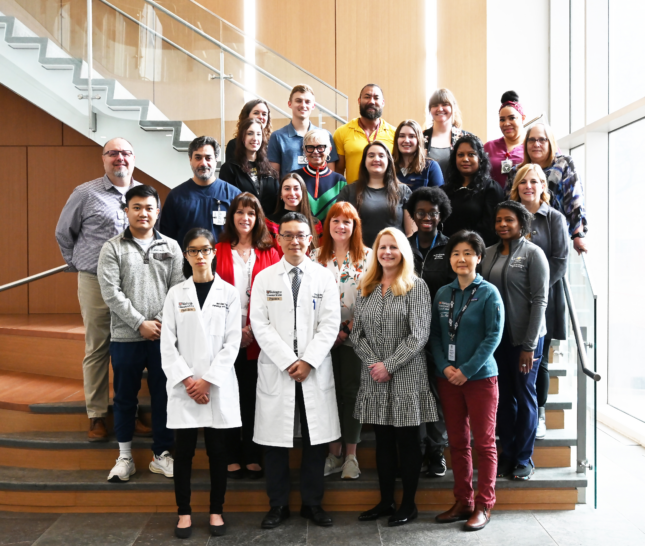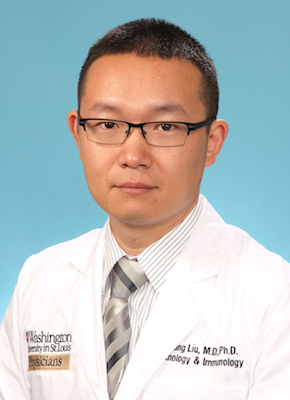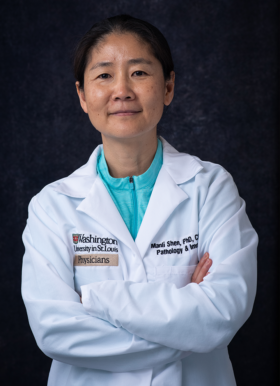
The Histocompatibility and Immunogenetics Fellowship program at Washington University School of Medicine provides comprehensive training over a two-year period. The program is designed to fulfill the clinical laboratory training requirements necessary for accreditation by the American College for Histocompatibility and Immunogenetics (ACHI). Fellows attain in-depth knowledge and experience in clinical testing performed in a large lab with state-of-the-art platforms.
There has been a long tradition of excellence in education and research related to HLA testing and transplant immunology at WashU since the 1980s under the leadership of Dr. Thalachallour Mohanakumar. Many previous trainees went on to direct HLA laboratories in leading transplant centers such as Mayo Clinic, MD Anderson, and UC San Diego. The fellowship program had been inactive after Dr. Mohanakumar’s departure in 2016 but was reactivated in 2022, with Dr. Chang Liu serving as the fellowship program director. Under Dr. Liu’s leadership, we proudly welcomed our inaugural fellow, Dr. Manli Shen, to our program on March 28, 2022. The fellowship program is designed to provide comprehensive training over a two-year period, specifically designed to fulfill the clinical laboratory training requirements necessary for accreditation by the American College for Histocompatibility and Immunogenetics (ACHI).
This is a non-ACGME-accredited fellowship program. Trainees acquire in-depth knowledge and experience in clinical testing performed in HLA Laboratory at Barnes-Jewish Hospital in support of the following areas of patient care on campus: 1) living-donor solid-organ transplantation, 2) deceased-donor solid-organ transplantation, 3) related-donor hematopoietic stem cell transplantation, 4) unrelated-donor hematopoietic stem cell transplantation, and 5) other clinical applications, including transfusion support and diagnostic work-up for diseases associated with specific HLA alleles or antigens. Trainees develop proficiency in the technical aspects of HLA typing, antibody screen and identification, and crossmatching. Additionally, they gain expertise in providing clinical consultation for the nuanced interpretation of testing results.
The above goals are achieved through a series of activities embedded in the fellowship training curriculum, including: 1) daily laboratory rounds and weekly didactics, 2) participating in weekly or monthly clinical conferences with various transplant teams, 3) conducting results review and interpretation, 4) supporting test validation and implementation, 5) being on call to provide clinical consultations supporting both laboratory operations and transplantations, 6) participating in laboratory management and quality improvement projects, 7) conducting histocompatibility and immunogenetics-related research, 8) participating in teaching sessions for laboratory staff and other clinical trainees.
This multifaceted approach ensures a well-rounded and immersive learning experience, fostering the development of expertise across various aspects of histocompatibility and immunogenetics. Toward the end of the training, the trainees will build a high-quality portfolio of cases in required clinical categories and be eligible for the diplomate examination and oral interview. Upon successful accreditation by ACHI, program graduates will be well-prepared to embark on a strong career path, assuming roles as Directors, Techincal Supervisors, and Clinical Consultants for HLA laboratories accredited by ASHI or CAP.
The HLA laboratory at Barnes-Jewish Hospital, under the medical directorship of the Program Director, provides the basic setting for the fellowship training. The laboratory is accredited by the American Society for Histocompatibility and Immunogenetics (ASHI) and the American College of Pathologists (CAP). It has over 10,000 square feet of lab space in the BJC Institute of Health Building and performs over 4,000 histocompatibility tests monthly for the adult and pediatric solid organ and stem cell transplant programs on campus. The HLA laboratory is equipped with state-of-the-art platforms for serologic and molecular HLA testing, including three FLEXMAP 3D Luminex instruments, two Ion-Chef/Ion-torrent S5 sequencers, and two CytoFLEX flow cytometers. Additional space and facilities are available through the Division of Laboratory Medicine, which provides office space for fellows, multiple teaching classrooms, audiovisual equipment and a specialized clinical pathology medical library in the fellows’ office area.
Interested individuals should have an MD degree, or a PhD degree (in immunology and other biomedical directions), or both. For candidates with MD, being board-certified or board-eligible in Clinical Pathology and subspecialties is a valuable complement. A successful candidate will have excellent interpersonal skills, a passion for patient care, and motivation for research and teaching.
Personal statement, Curriculum Vita, and three reference letters.
Contact: Lana Torry, lanaktorry@wustl.edu
Faculty

Chang Liu, MD, PhD
Associate Professor, Pathology & Immunology
Section Head, Blood Bank/Apheresis/CTL/HLA
Director, Histocompatibility and Immunogenetics Fellowship
- Email: cliu32@nospam.wustl.edu
Division: Laboratory & Genomic Medicine
Trainees
Contact information
Lana Torry
Senior Fellowship Program Coordinator
Phone: 314-273-5476
lanaktorry@wustl.edu
